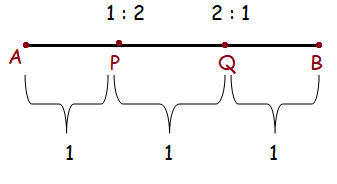FINDING THE COORDINATES OF POINT OF TRISECTION
Subscribe to our ▶️ YouTube channel 🔴 for the latest videos, updates, and tips.
Question 1 :
Find the coordinates of the points of trisection of the line segment joining the points A(−5, 6) and B(4,−3).
Solution :

= (mx2 + nx1)/(m + n), (my2 + ny1)/(m + n)
Point P divides the line segment in the ratio 1 : 2
A(−5, 6) and B(4,−3)
= (1(4) + 2(-5))/(1 + 2), (1(-3) + 2(6))/(1 + 2)
= (4 - 10)/3, (-3 + 12)/3
= -6/3, 9/3
= (-2, 3)
Point Q divides the line segment in the ratio 2 : 1
A(−5, 6) and B(4,−3)
= (2(4) + 1(-5))/(2 + 1), (2(-3) + 1(6))/(1 + 2)
= (8 - 5)/3, (-6 + 6)/3
= 3/3, 0/3
= (1, 0)
Question 2 :
The line segment joining A(6,3) and B(−1, −4) is doubled in length by adding half of AB to each end. Find the coordinates of the new end points.
Solution :

To find the half of the length of AB, we have to find the midpoint of the line segment AB.
Let C be the point which divides the line segment AB in the ratio 1 : 1
= (mx2 + nx1)/(m + n), (my2 + ny1)/(m + n)
= (1(-1) + 1(6))/(1 + 1), (1(-4) + 1(3))/(1 + 1)
= (-1 + 6)/2, (-4 + 3)/2
= (5/2, -1/2)
A is the point which divides the line segment in the ratio 1 : 2 internally.
A(6, 3) = (mx2 + nx1)/(m + n), (my2 + ny1)/(m + n)
(1(-1) + 2x1)/(1 + 2), (1(-4) + 2y1)/(1 + 2) = (6, 3)
(-1 + 2x1)/3, (-4 + 2y1)/3 = (6, 3)
Equating the x and y -coordinates
|
(-1 + 2x1)/3 = 6 -1 + 2x1 = 18 2x1 = 19 x1 = 19/2 |
(-4 + 2y1)/3 = 3 -4 + 2y1 = 9 2y1 = 9 + 4 x1 = 13/2 |
Hence the point D is (19/2, 13/2).
B is the point which divides the line segment in the ratio 2 : 1 internally.
B(-1, -4) = (2x2 + 1(6))/(2 + 1), (2y2 + 1(3))/(2 + 1)
(2x2 + 6)/3, (2y2 + 3)/3 = B(-1, -4)
Equating the x and y -coordinates
|
(2x2 + 6)/3 = -1 2x2 + 6 = -3 2x2 = -3 - 6 2x2 = -9 x2 = -9/2 |
(2y2 + 3)/3 = -4 2y2 + 3 = -12 2y2 = -12 - 3 2y2 = -15 y2 = -15/2 |
Hence the point E is (-9/2, -15/2).
Question 3 :
Find the coordinates of point of trisection of the segment joining points (4, -8) and (7, 4).
Solution :
In the trisection, the first point will divide the line segment joining the above points in the ratio of 1 : 2.
Let A and B be the required points.
Using section formula,
= (1(7) + 2(4)) / (1 + 2), (1(4) + 2(-8)) / (1 + 2)
= (7 + 8)/3, (4 - 16)/3
= 15/3, -12/3
= A(5, -4)
So, the point A (5, -4).
In the trisection, the second point will divide the line segment joining the above points in the ratio of 2 : 1.
Using section formula,
= (2(7) + 1(4)) / (2 + 1), (2(4) + 1(-8)) / (2 + 1)
= (14 + 4)/3, (8 - 8)/3
= 18/3, 0/3
= (6, 0)
So, the point B is (6, 0).
Question 4 :
If A (5, -1), B (-3, -2) and C (-1, 8) are vertices of triangle ABC, find the length of median through A and find the coordinates of the centroid.
Solution :
A (5, -1), B (-3, -2) and C (-1, 8)
Centrod of the triangle = (x1 + x2 + x3)/3, (y1 + y2 + y3)/3
= (5 - 3 - 1)/3, (-1 - 2 + 8)/3
= (5 - 4)/3, (-3 + 8)/3
= Centroid (1/3, 5/3)
Midpoint of BC :
B (-3, -2) and C (-1, 8)
= (-3 - 1)/2, (-2 + 8)/2
= -4/2, 6/2
= (-2, 3)
Endpoint of median through A is (5, -1) and (-2, 3).
distance between these two points
= √(x2 - x1)2 + (y2 - y1)2
= √(-2 - 5)2 + (3 + 1)2
= √(-7)2 + 42
= √49 + 16
= √65
So, the length of median through A is √65.
Question 5 :
The line joining the points (2, 1) and (5, 8) is trisected at the points P and Q. If point P lies on the line 2x - y + k = 0, find the value of k ?
Solution :
Since the given points are trisected by the points P and Q, the point P will divide the line segment in the ratio of 1 : 2.
= (lx2 + mx1)/(l + m), (ly2 + my1)/(l + m)
= (1(5) + 2(2))/(1 + 2), (1(8) + 2(1))/(1 + 2)
= (5 + 4)/3, (8 + 2)/3
= (9/3, 10/3)
= (3, 10/3)
2x - y + k = 0
Since the point (3, 10/3) lies on the line 2x - y + k = 0, we apply this point.
2(3) - (10/3) + k = 0
6 - (10/3) + k = 0
8/3 + k = 0
k = -8/3
So, the value of k is -8/3.
Subscribe to our ▶️ YouTube channel 🔴 for the latest videos, updates, and tips.
Kindly mail your feedback to v4formath@gmail.com
We always appreciate your feedback.
About Us | Contact Us | Privacy Policy
©All rights reserved. onlinemath4all.com

Recent Articles
-
Challenging SAT Math Problems
Feb 17, 26 06:45 AM
Challenging SAT Math Problems -
Quantitative Reasoning Questions and Answers
Feb 17, 26 02:03 AM
Quantitative Reasoning Questions and Answers -
SAT Math Practice Hard Questions
Feb 16, 26 08:56 AM
SAT Math Practice Hard Questions
